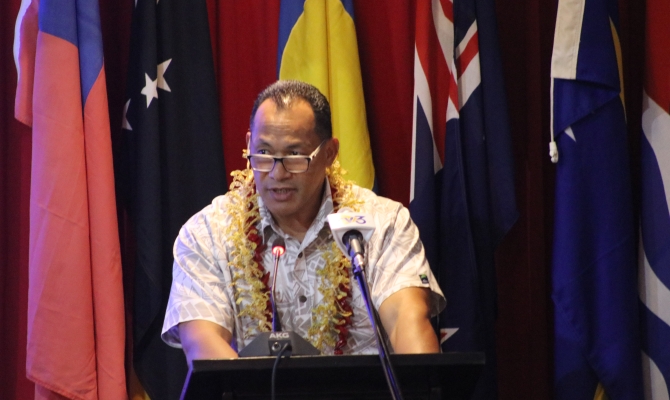
The Honorable Chair to the Tenth Conference of the Parties to the Waigani Convention
Distinguished representatives of Parties,
Distinguished observers,
Ladies and gentlemen,
We gather here as stewards of the Pacific environment and amongst the many battles we fight, one of the most important one is our efforts to protect our people and the environment from the adverse impacts of hazardous waste. The Conference of Parties to the Waigani Convention is our opportunity to undertake affirmative decisions that will lead to helping the region manage the impacts of hazardous waste in an environmentally sound manner and I am therefore pleased to have this privilege to welcome you all to Samoa for this the 10th Conference of the Parties to the Waigani Convention. It is fitting that this COP is held in Samoa where the Waigani Convention has found a home within SPREP under its role as the Pacific Regional Centre for the joint implementation of the Basel and Waigani Conventions.
Since the first conference of the Parties in 2002, the Waigani Convention has gradually become an effective mechanism to address the region’s hazardous waste management challenges. I believe many of you seated here today have been instrumental in getting the Convention to where it is today and must be commended for your efforts. The Convention is now in a better position with all the necessary frameworks and procedures in place to allow parties to manage their hazardous wastes in an environmentally sound manner. The Convention is also lifting the profile of hazardous waste management in the region and I believe hazardous waste is steadily climbing up the rank of country priorities.
However, we will not be complacent because there remains a lot more that we can do to fully meet our obligations under the Convention and take it to the next level. In the last decade the Convention has played a pivotal role in facilitating the trans-boundary movement of more than 140 tons of hazardous wastes from the Pacific region to Australia under the Persistent Organic Pollutants in Pacific Islands Countries Project better known as the POPs in PICs Project. The POPs approach has since served as a model in designing similar projects in other regions of the world.
The Waigani Convention is recognized globally by the Secretariat of the Basel Convention with the setup of Pacific Regional Centre (PRC) For Training and Technology Transfer For the Joint Implementation Of the Basel and Waigani Convention in the South Pacific Region in an MOU signed with SPREP. This has allowed joint collaborations to be undertaken with the Basel Convention Secretariat and its network of other Regional Centers such as the South East Asian centre in China.
As you all know, the Rotterdam and Stockholm Conventions are the other major hazardous waste conventions to which many of our Member countries are also Parties to. Managing our obligations to all these conventions can therefore be a daunting task but thanks to the synergies that exist between the Basel, Rotterdam and Stockholm conventions (BRS triple COPs), Parties are given a better platform to meet their requirements. The Waigani Convention Secretariat is the link between Pacific member Parties and these three conventions. The Secretariat has also currently established working relationships with the Secretariat of the Minamata Convention on mercury and mercury substances which will allow all work related to hazardous waste and materials to be dealt with and coordinated from the same place in the region.
Dear colleagues, the agenda for this COP meeting has a number of significant issues that need careful consideration and deliberation and I am sure you will engage deeply and debate and discuss these issues with one common goal of finding solutions to the hazardous waste problems that present many challenges to our development aspirations. We at the Secretariat look forward to the outcomes and guidance that this COP will provide in assisting us to serve you better.
I must pay tribute to the Waste Management and Pollution Control Division under the leadership of their Director Dr Vicki Hall for their efforts in convening this important meeting and securing much needed resources to assist you the Parties in meeting your obligations to all conventions to which you are Parties. I can inform you that the team is currently at the design and mobilization stagess of a few flagship projects that will make a huge impact in the region and keep it free from hazardous wastes.
Finally, I would ask that you spare a thought regarding your commitments to the Convention. As the workload is increasing, more important decisions need to be made by Parties and actioned by the Scientific and Technical Advisory Committee (STAC) and the Steering Committee of the Pacific Regional Center (SC-PRC). It is your valuable contributions in terms of time and resources that enable these critical meetings to happen and the services to be delivered.
I wish you every success in your deliberations today.
Thank you